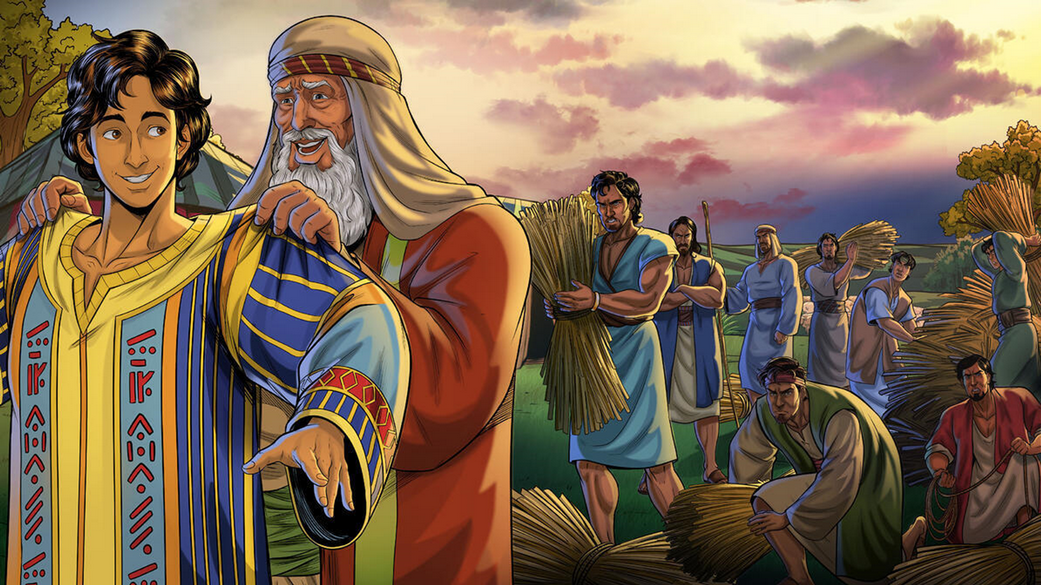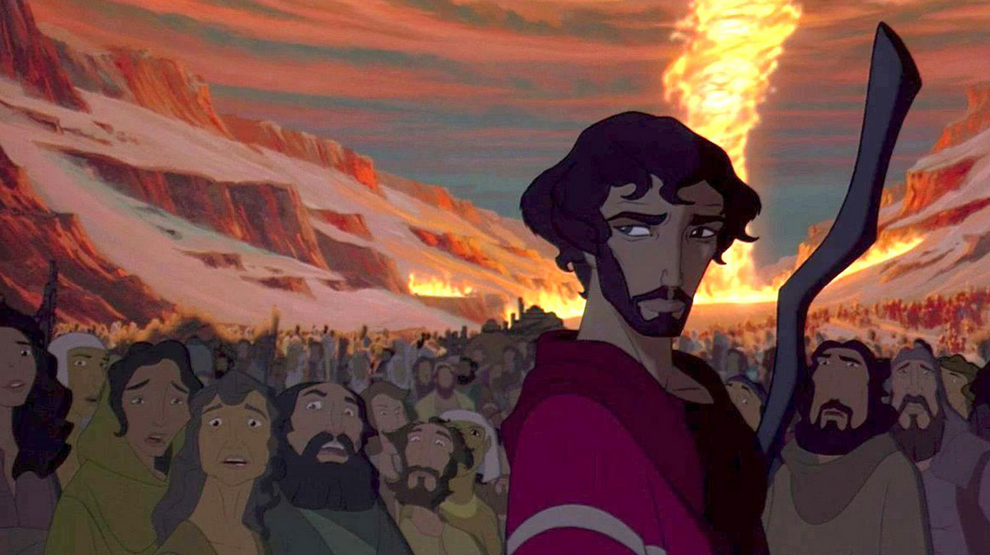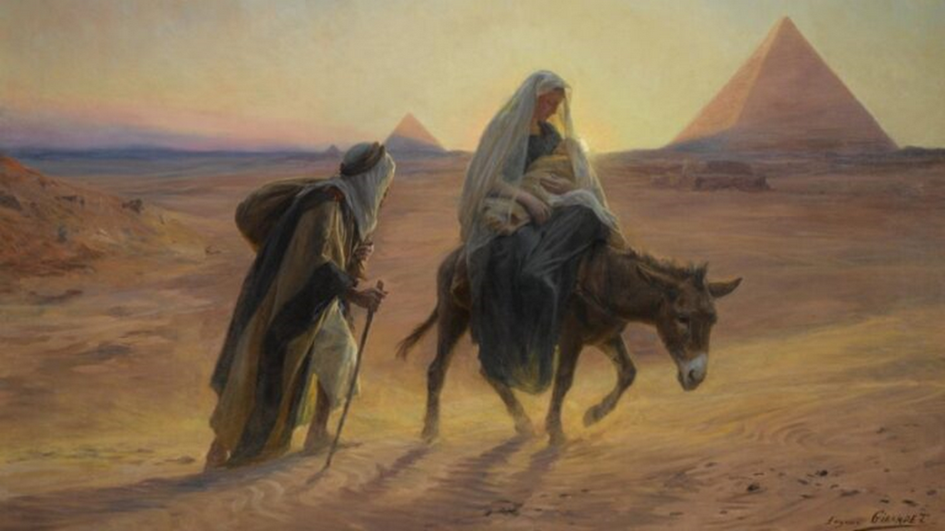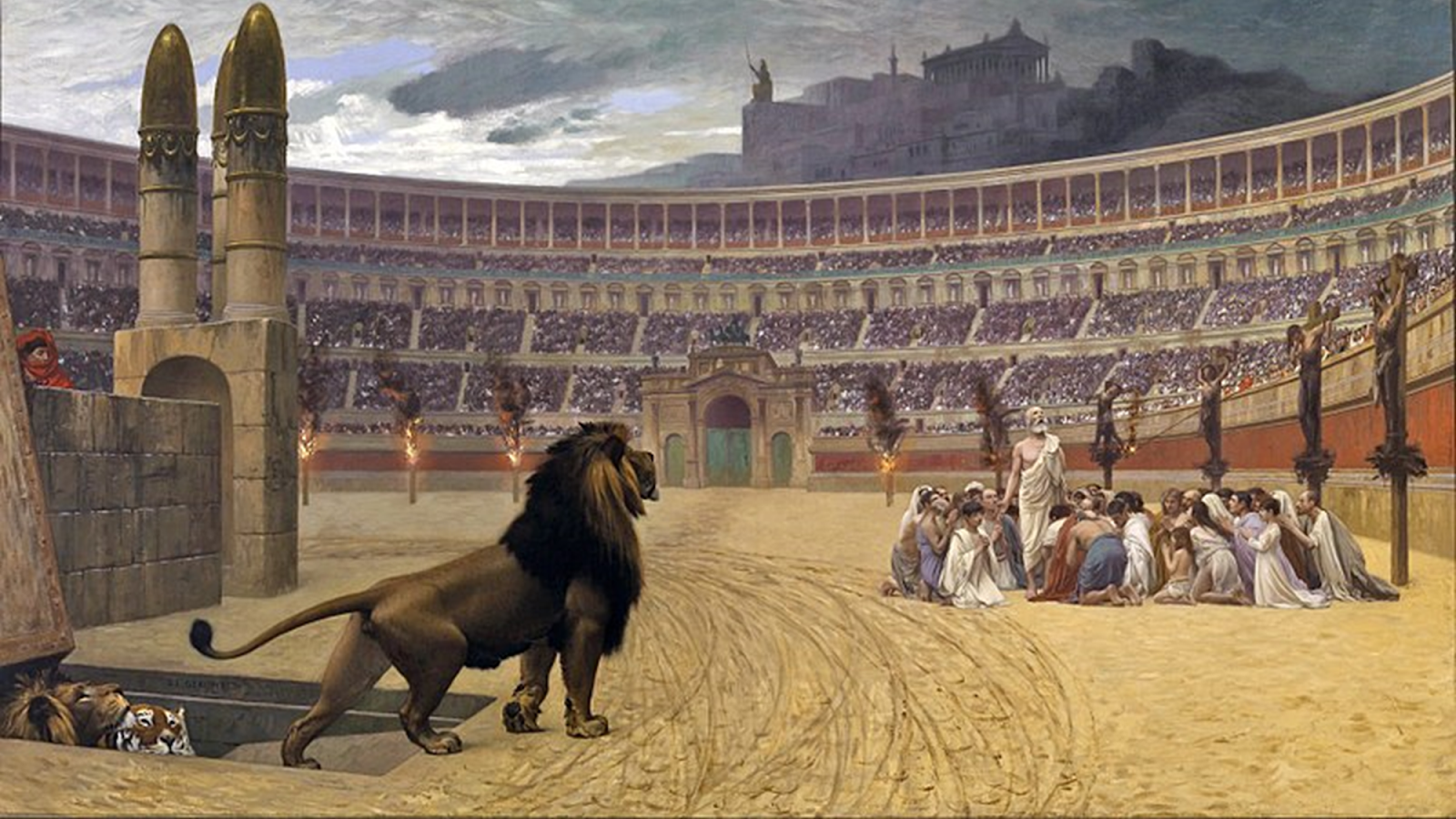Blessed Are the Persecuted
OT Lesson: Daniel 3:1-30 (NLT)
King Nebuchadnezzar made a gold statue ninety feet tall and nine feet wide and set it up on the plain of Dura in the province of Babylon. Then he sent messages to the high officers, officials, governors, advisers, treasurers, judges, magistrates, and all the provincial officials to come to the dedication of the statue he had set up. So all these officials came and stood before the statue King Nebuchadnezzar had set up.
Then a herald shouted out, “People of all races and nations and languages, listen to the king’s command! When you hear the sound of the horn, flute, zither, lyre, harp, pipes, and other musical instruments, bow to the ground to worship King Nebuchadnezzar’s gold statue. Anyone who refuses to obey will immediately be thrown into a blazing furnace.”
So at the sound of the musical instruments, all the people, whatever their race or nation or language, bowed to the ground and worshipped the gold statue that King Nebuchadnezzar had set up.
But some of the astrologers went to the king and informed on the Jews. They said to King Nebuchadnezzar, “Long live the king! You issued a decree requiring all the people to bow down and worship the gold statue when they hear the sound of the horn, flute, zither, lyre, harp, pipes, and other musical instruments. That decree also states that those who refuse to obey must be thrown into a blazing furnace. But there are some Jews—Shadrach, Meshach, and Abednego—whom you have put in charge of the province of Babylon. They pay no attention to you, Your Majesty. They refuse to serve your gods and do not worship the gold statue you have set up.”
Then Nebuchadnezzar flew into a rage and ordered that Shadrach, Meshach, and Abednego be brought before him. When they were brought in, Nebuchadnezzar said to them, “Is it true, Shadrach, Meshach, and Abednego, that you refuse to serve my gods or to worship the gold statue I have set up? I will give you one more chance to bow down and worship the statue I have made when you hear the sound of the musical instruments. But if you refuse, you will be thrown immediately into the blazing furnace. And then what god will be able to rescue you from my power?”
Shadrach, Meshach, and Abednego replied, “O Nebuchadnezzar, we do not need to defend ourselves before you. If we are thrown into the blazing furnace, the God whom we serve is able to save us. He will rescue us from your power, Your Majesty. But even if He doesn’t, we want to make it clear to you, Your Majesty, that we will never serve your gods or worship the gold statue you have set up.”
Nebuchadnezzar was so furious with Shadrach, Meshach, and Abednego that his face became distorted with rage. He commanded that the furnace be heated seven times hotter than usual. Then he ordered some of the strongest men of his army to bind Shadrach, Meshach, and Abednego and throw them into the blazing furnace. So they tied them up and threw them into the furnace, fully dressed in their pants, turbans, robes, and other garments. And because the king, in his anger, had demanded such a hot fire in the furnace, the flames killed the soldiers as they threw the three men in. So Shadrach, Meshach, and Abednego, securely tied, fell into the roaring flames.
But suddenly, Nebuchadnezzar jumped up in amazement and exclaimed to his advisers, “Didn’t we tie up three men and throw them into the furnace?”
“Yes, Your Majesty, we certainly did,” they replied.
“Look!” Nebuchadnezzar shouted. “I see four men, unbound, walking around in the fire unharmed! And the fourth looks like a god!”
Then Nebuchadnezzar came as close as he could to the door of the flaming furnace and shouted: “Shadrach, Meshach, and Abednego, servants of the Most High God, come out! Come here!”
So Shadrach, Meshach, and Abednego stepped out of the fire. Then the high officers, officials, governors, and advisers crowded around them and saw that the fire had not touched them. Not a hair on their heads was singed, and their clothing was not scorched. They didn’t even smell of smoke!
Then Nebuchadnezzar said, “Praise to the God of Shadrach, Meshach, and Abednego! He sent His angel to rescue His servants who trusted in Him. They defied the king’s command and were willing to die rather than serve or worship any god except their own God. Therefore, I make this decree: If any people, whatever their race or nation or language, speak a word against the God of Shadrach, Meshach, and Abednego, they will be torn limb from limb, and their houses will be turned into heaps of rubble. There is no other god who can rescue like this!”
Then the king promoted Shadrach, Meshach, and Abednego to even higher positions in the province of Babylon.
NT Lesson: Matthew 5:10 (NRSV)
Blessed are those who are persecuted for righteousness’ sake, for theirs is the kingdom of heaven.
Sermon
Introduction
Good morning. I apologise that I skipped the closing hymn last Sunday. I didn’t even notice it until Lisa told me after the service. So next time when I make a mistake, you can tell me loud and clear. I promise that we will sing the closing hymn today for sure. It truly feels like autumn now, doesn’t it? I’ve always loved this season and the way the colours change around us. Once I overheard a father said in Canada, “Hey look. The trees are changing.” And a son around 3 or 4 asked back, “Into what?” Well, the trees are still trees but their colours are changing. The ginkgo trees turn a brilliant yellow, and the maples blaze in shades of red. The beauty of the creation is all around us, even in the smallest details of God’s creation. As we move through this beautiful season, my prayer is that God opens our eyes so that we may see the divine beauty in the ordinary things we see everyday, moments that we might otherwise overlook.Old Testament Examples of Persecution

Story of Joseph
Let’s start with Joseph. He was Jacob’s favourite son, not only because he was the youngest at the time, but because he was the first son of Jacob’s favourite wife, Rachel. Jacob showed obvious favouritism toward Joseph, which stirred resentment among his older brothers. Joseph also didn’t act wisely. When God gave him dreams foretelling his future, instead of keeping them to himself, he boasted to his brothers, telling them, “I will one day be great, and you will all serve me. I am going to be your big boss and you will bow down before me to the ground.” Naturally, his brothers were furious and wanted to beat him up, but they held back because of their father’s presence. Not wise but still Joseph spoke the truth, and for that, he was persecuted. His brothers sold him into slavery in Egypt.
Even in Egypt, Joseph was blessed by God. He became the head steward in his master’s house. However, his troubles were not over. I imagine Joseph was a handsome, well-built young man with six pack on his belly. He must have stood out in Egypt where many guys worked topless. His master’s wife took notice and tried to seduce him. Last night I looked up the Oxford English Dictionary. According to the dictionary, the wife of the master is called a “mistress,” but there is another meaning to that word which you all probably know, and in this case, Joseph’s mistress wanted to become his mistress. It may sound like nonsense, but in English, anything can make sense. Nevertheless, Joseph knew it is immoral to have an affair with his master’s wife, so he refused her advances. Angered by his rejection, she falsely accused him, and he was thrown into prison unfairly and unjustly. Once again, Joseph was persecuted for doing what was right. But, as we know, God ultimately raised him up to become the prime minister of Egypt. Then Joseph was given a chance to revenge on his brothers. And his revenge was saving them from famine. This is a powerful example of what the Apostle Paul teaches in Romans 12, quoting Proverbs 25: “If your enemies are hungry, feed them; if they are thirsty, give them something to drink; for by doing this, you will heap burning coals on their heads.”
Story of Moses
Hundreds of years later, another Hebrew boy, Moses, was raised as a prince in Egypt. But when he discovered his true identity, he was filled with compassion for his fellow Hebrews. One day, seeing a Hebrew being mistreated by an Egyptian, Moses intervened. However, this act of righteousness led to his rejection by both his own people and the Egyptians. He had to flee Egypt and spent forty years in exile. The prince of Egypt became a fugitive in a foreign land, persecuted for righteousness’ sake. Yet, God called him back to lead His people out of slavery into freedom.
Stories from Daniel
In Daniel 6, we see another powerful example. King Darius signed a decree that forbade anyone from praying to any god except him. The punishment was death by being thrown into a den of hungry lions. Despite the decree, Daniel continued to pray to God three times a day, with his windows wide open for all to see. He didn’t hide his faith, and as a result, he was thrown into the lions’ den. Daniel was persecuted for righteousness’ sake, but God protected him, and he emerged unharmed.
Now, in today’s Old Testament lesson from Daniel 3, we hear about Daniel’s three friends—Shadrach, Meshach, and Abednego—who risked their lives to maintain their faith. In this story, King Nebuchadnezzar had built a golden statue and issued a decree that everyone must bow down and worship the idol altogether during the opening ceremony. Anyone who refused would be thrown into a furnace. Shadrach, Meshach, and Abednego, who shared the same great faith as Daniel, refused to worship the idol. Because they were respected and valuable officials in the empire, the king offered them a second chance. But their response reveals the depth of their faith: “If we are thrown into the blazing furnace, the God we serve is able to save us from it, and He will rescue us from your hand. But even if He does not, we want you to know, that we will not serve your gods or worship the image of gold you have set up.”
Their answer amazes me, giving me tons of goose bumps. It shows a faith so deep that they were willing to die rather than compromise. And now I wonder: Where was Daniel? The decree says that everyone—high officers, officials, governors, advisers, treasurers, judges, magistrates, and provincial officials—was present. So, it was a must that Daniel also was there. Then why was he not arrested along with his three friends? Did he bow down to the idol? That seems unlikely, but I cannot say for sure. Was he hiding? Possibly, but that does not seem in line with his character either, seeing that he prayed with his windows wide open. The Bible doesn’t give us the answer, and I don’t know. If you have any thoughts or speculations, I’d love to hear them. It’s something I’ve been curious about!
In any case, Daniel’s three friends were thrown into the blazing furnace. The flames were so intense that even the soldiers who threw them in were killed by the heat. Yet, Shadrach, Meshach, and Abednego didn’t die, nor were they even burned. And when the king looked into the furnace, he saw not three men, but four. The fourth, as the New Living Translation puts it, looked “like a god,” but in the Hebrew text, it says the fourth figure looked like the “Son of God.” So we can say that in the persecution, Jesus was with them, suffering on behalf of them. In the end, the three friends were saved, and not only that, they were promoted to even higher positions in the empire, getting much bigger pay-cheques.
Story of Jesus
Now, when we turn to the New Testament, we quickly realise that it is overflowing with examples of persecution. In fact, the story of Jesus begins with persecution. Right from His birth, the Nativity story shows us an infant Saviour under threat. King Herod, fearing the prophecy of a newborn King, sought to kill the child Jesus. The Holy Family was forced to flee to Egypt to escape this danger. So even in His infancy, Christ faced persecution.
As we trace His life, we see that Jesus’ entire ministry was marked by opposition and suffering. From the moment He began teaching and healing, He was challenged by the religious leaders, questioned by the authorities, and misunderstood by the people He came to save. Ultimately, His commitment to righteousness led Him to the cross—the greatest act of persecution imaginable. Yet, in His resurrection and ascension, Jesus triumphed over all opposition. Now, as we confess in the Apostles’ Creed, He is seated at the right hand of God the Father Almighty, and indeed, the kingdom of heaven is His.
Story of the Disciples
But Jesus was not alone in facing persecution. All of His disciples, except Judas Iscariot, who betrayed Him, endured tremendous suffering for their faith. After Judas was replaced by Matthias, all twelve apostles went on to spread the Gospel, despite fierce opposition. According to tradition, every one of them faced persecution, and all were martyred but John. Peter was crucified upside down in Rome. James, the brother of John, was killed by the sword under King Herod’s orders. Thomas, the questioner, was speared to death in India while sharing the Gospel. The lives of the apostles are testimonies to the cost of discipleship, as they followed their Lord even unto death.
Story of Stephen
One of the most moving examples of early Christian persecution is Stephen, the first martyr of the faith. As the first deacon, Stephen was known for his wisdom and fullness of the Spirit. When he boldly proclaimed the truth of Christ to the Jewish leaders, they responded by stoning him to death. Yet, even in his final moments, Stephen demonstrated the spirit of Christ, praying, “Lord, do not hold this sin against them” (Acts 7:60). His death ignited a wave of persecution, but also, paradoxically, the rapid spread of the Gospel, not only in Jerusalem but also in all the regions of the known world.
Story of Apostle Paul
And of course, we can’t speak about persecution in the New Testament without mentioning the Apostle Paul. His life, recorded in the book of Acts and his letters, is a profound testimony to enduring faith in the face of opposition. Once a persecutor of Christians himself, Paul experienced relentless suffering after his conversion. He was imprisoned, beaten, stoned, shipwrecked, and eventually executed for his faith. Yet, despite all this, Paul remained steadfast, declaring, “I am not ashamed of the Gospel, for it is the power of God for salvation” (Romans 1:16). He saw his suffering as a way to participate in Christ’s own suffering and counted it a privilege to endure for the sake of righteousness.
Story of the Church
In fact, throughout the New Testament, we see persecution as almost a hallmark of Christian faith. Jesus Himself told His followers, “If they persecuted me, they will persecute you also” (John 15:20). The early church lived with this reality, as believers were arrested, beaten, and even killed for their faith in Christ. Yet, instead of silencing the message, persecution only seemed to embolden the church. The blood of the martyrs, as Tertullian famously said, became “the seed of the Church.”
Even the book of Revelation, which offers a vision of the ultimate triumph of God’s kingdom, speaks to the experience of persecution. In this apocalyptic vision, the faithful endure great suffering for their witness to Christ, but they are promised a glorious future. The New Jerusalem—the new heaven and earth—descends, and the persecuted Christians are invited to dwell there with the Lamb of God forever. This is the ultimate hope of those who are persecuted for righteousness’ sake: that their faithfulness will be rewarded with the kingdom of heaven, where there is no more death, mourning, or pain.
Other examples of persecution include the early Christians who were targeted by the Roman Empire. Figures like Emperor Nero used Christians as scapegoats, blaming them for disasters like the Great Fire of Rome. Christians were thrown to wild animals in the Colosseum, burned at the stake, and subjected to all manner of brutal executions. Yet, they held firm in their faith, trusting in Jesus’ promise that “blessed are those who are persecuted for righteousness’ sake, for theirs is the kingdom of heaven.”
In this way, the New Testament paints a vivid picture of the cost of discipleship. Persecution is not something to be feared but is part of the journey toward the ultimate hope that we have in Christ. The message is clear: though persecution may come, it doesn’t have the final word. The kingdom of heaven belongs to those who remain steadfast, just as it belongs to Christ Himself, who conquered death.
Conclusion
Next Sunday, we will bring our Beatitudes sermon series to a close by looking at the final two verses of Matthew 5:11-12. Today’s message sets the stage for that conclusion, as both this week and next, we are focusing on the theme of persecution. So, instead of offering you a final conclusion today, I want to leave you with a question to reflect on throughout the week. So your homework is thinking.
Jesus tells us, “Blessed are those who are persecuted for righteousness’ sake, for theirs is the kingdom of heaven.” We’ve seen from the stories in both the Old and New Testaments that this blessing is true. But here is the question I’d like you to consider: Are we, in our own lives, right now, being persecuted for righteousness’ sake? Which one of us is under persecution right now because of our Christian identity in this country where the freedom of religion is not only guaranteed but also legally protected? I guess not many of us are under persecution, if not none of us. Then if we are not experiencing persecution, how then can we claim that the kingdom of heaven is ours? What does this mean for us today? Take time this week to think about it. And please come back next Sunday for the answer. May God bless us with the kingdom of heaven. Amen.













Comments
Post a Comment